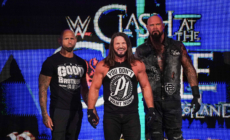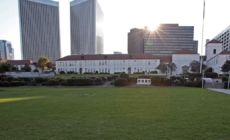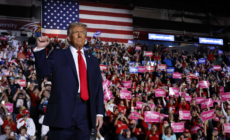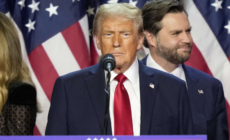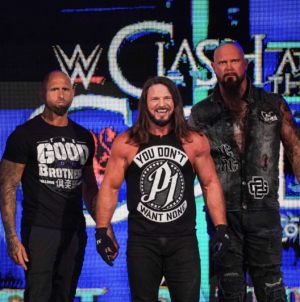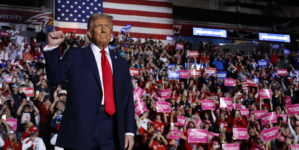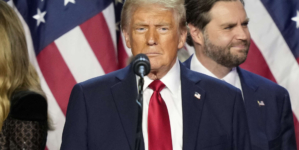-
WWE Superstar Karl Anderson Out Until Wrestlemania Due to Injury - 21 mins ago
-
Beverly Hills High limits gatherings in wake of Trump celebrations - 25 mins ago
-
Prince William says 2024 ‘has been the hardest year in my life’ - 34 mins ago
-
2024 NFL odds: AFC North sees huge shift after Thursday night result - 37 mins ago
-
Parting Shot: Donald Trump’s Historic Week and Its Impact on Pop Culture - about 1 hour ago
-
He thought he’d found Amelia Earhart’s plane. It was a pile of rocks - about 1 hour ago
-
Truckers to haul US Capitol Christmas tree from Alaska to DC, plus our latest American Culture Quiz - about 1 hour ago
-
Dolly Parton wants Kate Middleton and royal family to try her cooking at Dollywood this Thanksgiving - about 1 hour ago
-
Bears set to host Patriots, what happens if Drake Maye out plays Caleb Williams? | The Facility - about 1 hour ago
-
First person in Australia to be jailed for Nazi salute is unrepentant - about 1 hour ago
Saudi Arabia Is Becoming One of Biden’s Most Important Swing States
As President Joe Biden prepares to fight for reelection this November across a contentious battleground of U.S. states, the White House also finds itself vying for influence among several increasingly critical players on the world stage, among them a long-standing partner in the midst of groundbreaking changes in its policies at home and abroad.
At just 38 years old, Crown Prince Mohammed bin Salman of Saudi Arabia is one of the world’s youngest de facto heads of state and is the driving force behind a nationalist agenda that is taking hold in the kingdom. His father, 88-year-old King Salman, has led since 2015 but has increasingly handed over control to his seventh son since naming him next to rule in 2017 and prime minister in 2022, particularly amid growing concerns over the monarch’s health.
The transformation overseen by Crown Prince Mohammed, often referred to simply as MbS, has led to substantial shifts in the kingdom’s domestic outlook, which has embraced a more globalized character and a transition away from oil dependence, among other initiatives in line with the youngest-ever heir to the throne’s ambitious Vision 2030 plan. It’s also prompted a recalibration of foreign relations and the pursuit of more robust ties with other leading powers, including top U.S. rivals China and Russia.
Though officials in Riyadh and Washington continue to emphasize the importance of their partnership, recent rifts and painstaking negotiations currently taking place over the future of their cooperation have raised serious questions regarding the fate of one of the U.S.’ most strategic footholds in the Middle East.
Ali al-Shihabi, a Saudi political expert who founded the Arabia Foundation think tank and now serves on the advisory board of NEOM, one of several futuristic “megaprojects” outlined in Vision 2030, identified two primary factors behind the kingdom’s balancing act on international relations.
“One is the increasing importance of China as the single largest importer of Saudi oil and a partner that is willing to supply Saudi with arms and technology with no conditions attached,” Shihabi told Newsweek. “The second is the perceived unreliability of the relationship with the U.S. that can fluctuate dramatically depending on political currents in D.C., so Saudi feels it has to spread its chips.”
Photo-illustration by Newsweek/Getty
Kingmakers of the Middle East
The relationship between the U.S. and Saudi Arabia dates back to the earliest years of the kingdom, whose founder and namesake, King Abdulaziz ibn Saud, led a three-decade series of conquests to unite much of the Arabian Peninsula by 1932. These ties expanded into a strategic partnership during World War II and further developed throughout the Cold War, with Riyadh serving as a key bulwark against Soviet influence in the region, even amid some major disputes such as the 1973 oil embargo over U.S. support for Israel in the Yom Kippur War.
Not even Saudi Arabia’s murky ties to the 9/11 attacks—in which 15 of the 19 hijackers were Saudi nationals—would prove a lasting setback as the relationship only further solidified throughout the 21st century war on terror. Saudi Arabia would also go on to become a central player in the U.S. effort to counter Iranian influence across the Middle East and is still viewed as a crucial partner in this endeavor.
But while the U.S. has long benefitted from Saudi Arabia’s special influence as the world’s leading crude oil exporter and custodian of Islam’s holiest sites, and as the kingdom has enjoyed the Pentagon’s protection amid regional turbulence, interests have begun to diverge in recent years. The schism has grown particularly noticeable under the Biden administration.
Unlike Trump, under whom intimate ties with the rising crown prince were fostered, Biden has taken a harder line with Saudi Arabia and its star royal. On the campaign trail, the former vice president called Saudi Arabia a “pariah” over the killing of dissident journalist Jamal Khashoggi, which U.S. intelligence linked directly to the crown prince, and he announced an end to offensive weapons sales over concerns of civilian casualties in the kingdom’s intervention in the Yemeni civil war as one of his earliest major Middle East foreign policy moves upon taking office in 2021.
The president’s July 2022 visit to Saudi Arabia appeared to do little to mend frayed ties. Riyadh went on to openly defy U.S. calls to lower oil production in concert with fellow members of the expanded Organization of Petroleum Exporting Countries (OPEC+) amid the soaring energy costs fueled by sanctions over Russia’s war in Ukraine.
In sharp contrast to Biden’s cold reception, Chinese President Xi Jinping received a warm welcome later that same year as he oversaw the first-ever China-Arab State Summit. Months later, Riyadh reestablished diplomatic ties with Tehran in a Beijing-brokered agreement, and both proceeded to integrate themselves into two multilateral blocs in which China and Russia hold considerable influence, the Shanghai Cooperation Organization and BRICS.
Today, Biden is again looking to Riyadh for support amid the ongoing war in the Gaza Strip. The White House seeks to secure a so-called mega-deal that would involve U.S. security guarantees, along with nuclear and technology-sharing initiatives against the backdrop of lingering worries over Iran’s nuclear program, Israeli-Saudi diplomatic normalization as an effective extension of the Trump-era Abraham Accords and, perhaps most challenging of all, a pathway toward Palestinian statehood.
And yet the Biden administration has found Saudi Arabia to be driving a hard bargain as it utilizes its growing geopolitical clout to best serve Riyadh’s interests in dealing with both major and fellow emerging powers.

PEDRO PARDO/AFP/Getty Images
A Brave New Multipolar World
Riyadh is in a unique position to pursue this path given its already influential status as a leading member of OPEC, the Arab League and the Organization of Islamic Cooperation (OIC) as well as one of the fastest-growing economies of the G20. But it’s not alone in going down this road.
Nations adopting similar courses include Brazil, India, Indonesia, South Africa and Turkey, all of whom have sought to expand and diversify their international portfolios both East and West. Together, they form what experts at the German Marshall Fund (GMF) think tank have referred to as “global swing states.”
“As for many middle powers/swing states in the Global South, for Saudi Arabia, multi-alignment is the logical response to a more volatile, complex, multipolar world order,” Kristina Kausch, deputy managing director of GMF South who authored the report on Saudi Arabia’s position among these rising powers, told Newsweek. “Not marriage but a fluid set of relationships is the way Riyadh sees it can hedge against international instability and leverage its strengths and assets to greatest advantage.”
She argued that this strategy is especially essential for Saudi Arabia, “as the adaptation and sustainability of its geo-economic business model depends on good relations with the United States, China and Russia alike.”
As it stands, Washington remains Riyadh’s top security partner, but Beijing has emerged as its leading trade partner and energy client, and robust ties with Moscow are key to managing global energy production and pricing through OPEC+. Kausch said that “this results in a position of permanent ambiguity, which naturally leads to friction with the U.S. government, which would like to see Riyadh positioned more firmly in its own geopolitical camp.”
While she noted that a breakthrough in the ongoing negotiations leading to U.S. security guarantees could provide valuable benefits for both sides, she also argued that an “adjustment of the traditional U.S. approach is needed in the sense that Washington will have to understand that Riyad’s approach to the alliance is more transactional, and it will not align with U.S. preferences by default.”
“The U.S.’ narrowing approach to the Middle East in the past few years, seeing the region primarily through a lens of competition with China and Russia while countering Iran,” she added, “has not been conducive to this understanding.”
Bernard Haykel, professor of Near Eastern Studies at Princeton University, also observed the strategic adjustment in Riyadh’s standpoint.
“Saudi Arabia is aware that the world is no longer unipolar with just the United States dominating everything, and that it’s moving towards a multipolar world with other powers rising like China and India,” Haykel told Newsweek, “and that it has to maintain a relationship with as many of these countries, especially these rising powers, who are its major customers for oil and petrochemicals.”

Holmes Chan/AFP/Getty Images
Saudi Arabia First
Haykel maintains direct contacts with Crown Prince Mohammed and spoke to how the future monarch has reshaped the kingdom’s direction. He described the approach as a “Saudi First” policy, evoking the century-old “America First” doctrine more recently reinvigorated by Trump.
“The big difference is that Saudi Arabia is operating much more with nationalism in mind, rather than any other ideology,” Haykel said. “It’s putting its own self-interest before regional interests or, say, pan-Arab, pan-Islamic interests, which used to be important factors earlier, as well as American interests.”
“Given that it’s placing its own interests first and it’s desperately trying to transform itself and diversify its economy and become less dependent on oil revenues,” he added, “it is opting for policies that mean, for example, it has to keep excellent relations with China and America simultaneously.”
He argued that this policy of “Saudi-first is not intended to threaten the United States with a switch to China.” But, given the recent tensions in ties between Riyadh and Washington, he said it demonstrates the ability “to look at other options, to diversify relationships as much as possible.”
Haykel noted that the decision to clamp down on Islamist political activists and movements actually began under former King Abdullah, who led from 2005 to 2015, and “MbS basically put an end to these Islamists and instead has focused on a more traditional understanding of Islam that has to do with piety and belief and, when it comes to politics, more to do with nationalism as opposed to Islamism.”
The change has paved the way for more social reforms, including the lifting of a long-standing ban on women driving, easing the male guardianship system and establishing new entertainment centers. It’s also opened the door for attracting more foreign investment and campaigns to promote tourism, bringing high-profile concerts and sporting events, even the kingdom’s first women’s swimsuit fashion show and reports of a debut liquor store.
Both Haykel and Shihabi noted that there were risks to this endeavor, given the kingdom’s traditional ties to ultraconservative strains of Islam, which Shihabi pointed out “constitute a much smaller element of society than previously imagined.” These ideologies, most notably the state-backed school of Wahhabism, have long served as a cornerstone of the House of Saud’s legitimacy, but the most fundamentalist and sometimes violent interpretations of Islam have been decisively suppressed as the march toward Vision 2030 presses on.
What these reforms do not entail, however, are core compromises on broader concerns frequently raised by U.S. officials when it comes to democracy, freedom of expression and other human rights issues in the absolute monarchy. Whether Washington would accept this state of affairs moving forward is a matter of U.S. priorities, Haykel argued.
“I think it depends on what America wants from its relationship with Saudi Arabia,” Haykel said. “If it wants a responsible global producer of oil, a country that balances global oil markets through its production policies, then Saudi Arabia can do that quite well. But if it privileges human rights and values, then it’s going to be a tense relationship.”

Specialist Yancy Mendoza/Task Force Spartan/U.S. Army Central
The Cost of Failure
Abdulaziz al-Khamis, a prominent Saudi journalist and researcher, offered a solution through which he felt the Biden administration could improve its troubled ties with Riyadh. This would be realized through “strengthening diplomatic dialogue, reducing public criticism and taking into account geopolitical differences and diverging interests” and “offering mutual concessions on economic and security issues.”
However, “if the United States fails to stabilize its relationship with the kingdom, many risks could ensue,” Khamis told Newsweek, including, “a weakening of American influence in the Middle East, strengthening the influence of competitors such as China and Russia, which seek to strengthen their relations with the kingdom” as well as a situation that “may negatively affect the stability of global energy markets.”
Even a successful effort by the Biden administration may not be enough to sway a deep-rooted Saudi shift toward embracing new foreign ties that may run contrary to U.S. interests.
Khamis noted that the benefits of forging stronger cooperation with other powers include “diversifying alliances, which strengthens the kingdom’s position on the international scene and reduces its dependence on one country, diversifying trade and investment partners, which strengthens the Saudi economy,” and “improving national security by establishing strong relations with several major powers, which contributes to achieving a regional balance of power.”
“I expect that Crown Prince Mohammed bin Salman will continue this path in building relations with other major powers when he assumes power in the future,” Khamis added, “given the strategic and economic benefits that these relations provide.”
The U.S. coming to terms with Saudi Arabia’s “swing state” status is key to stabilizing and building upon further relations, argued Mohammed al-Hamed, a Saudi geopolitical analyst serving as president of the Saudi Elite consultancy.
“There is a real opportunity to achieve balance in Saudi-American relations—specifically with the Democratic Party and the Biden administration—by repairing what time has damaged from attempts to demonize relations with an important security ally of the United States,” Hamed told Newsweek.
Such attempts, Hamed argued, “always fail due to a very simple reason, that the kingdom is in a huge stage of economic, cultural, artistic, scientific and political development and maturity in Saudi leadership towards the Arab world, the Middle East, and the Islamic world towards moderation.”
A breakthrough would be particularly crucial, according to Hamed, at a time where Riyadh may have the capacity to effect real change during a period of substantial instability across the Middle East stemming from the war in Gaza.
“Saudi Arabia’s weight in economic and geopolitical spheres necessitates the U.S. to consider Saudi interests in negotiations,” Hamed said. “Given Saudi’s strategic importance, the U.S. may need to balance its administration ideology agenda with the broader benefits of maintaining a strong relationship with Riyadh.”
“If the U.S. needs to keep its influence in the Middle East,” he added, “it should ensure collaboration on mutual interests such as regional stability, counterterrorism and security efforts and energy security.”
Uncommon Knowledge
Newsweek is committed to challenging conventional wisdom and finding connections in the search for common ground.
Newsweek is committed to challenging conventional wisdom and finding connections in the search for common ground.
Source link
